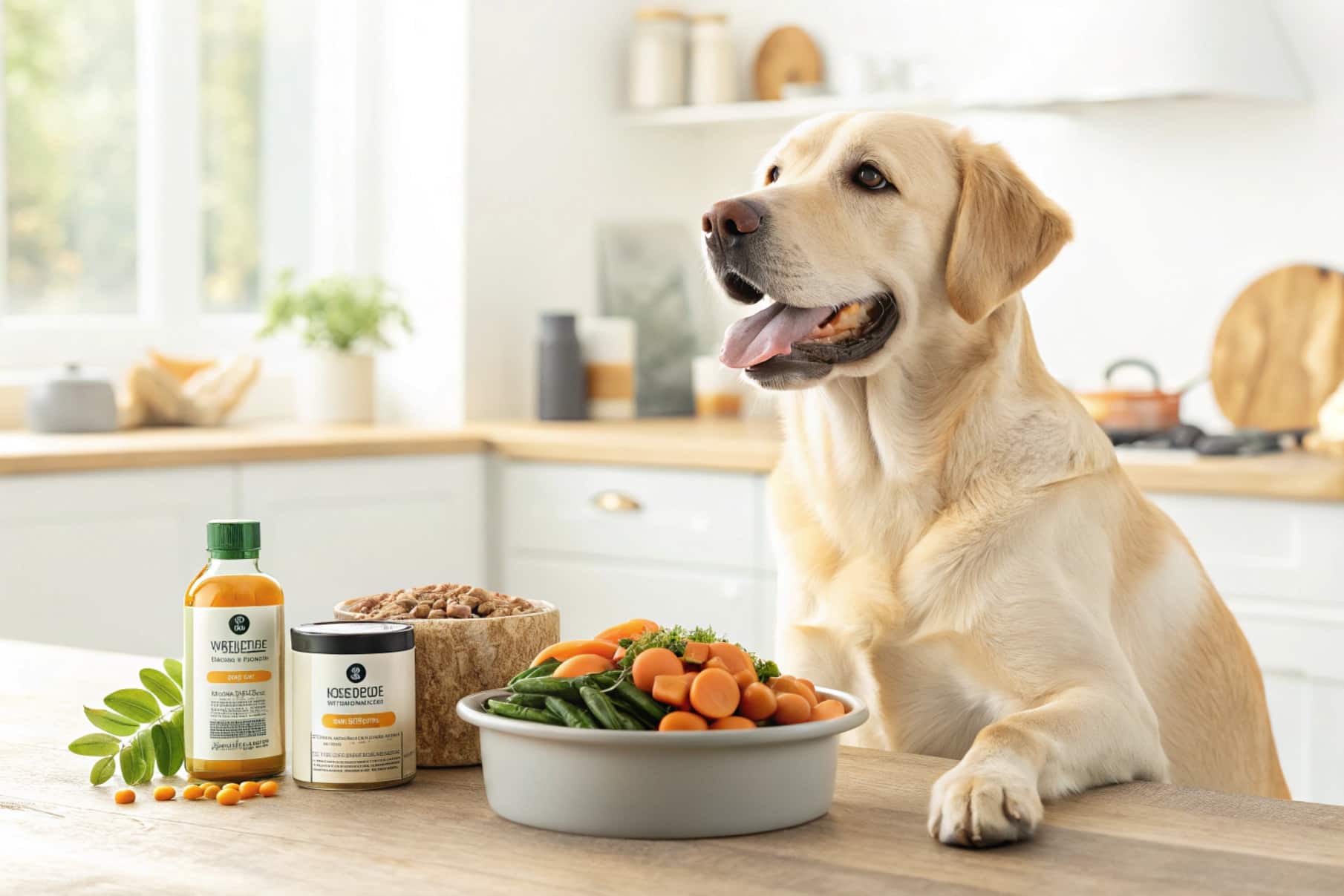What To Feed A Dog With Inflammatory Bowel Disease – Best Diet Tips That Work!
Inflammatory Bowel Disease (IBD) in dogs is a long-term condition that affects their digestive system, particularly the stomach and intestines. It can cause chronic vomiting, diarrhea, weight loss, poor appetite, and discomfort. Managing this condition is not just about medication diet plays a crucial role in reducing symptoms and improving your dog’s quality of life.
Knowing what to feed a dog with IBD can be confusing, especially when different foods trigger different reactions. That’s why choosing the right diet that suits your dog’s sensitive stomach is essential. This article will guide you through the best food options, important ingredients to look for, what to avoid, and how to plan meals for your dog with IBD.
what to feed a dog with inflammatory bowel disease natural?
For dogs with inflammatory bowel disease (IBD), a natural diet focuses on easily digestible, limited-ingredient foods that reduce irritation. Choose lean, cooked proteins like turkey or fish, and complex carbohydrates such as sweet potatoes or pumpkin for gentle fiber.
Avoid artificial additives, fillers, and grains that may trigger inflammation. Incorporate omega-3 fatty acids from fish oil to help manage inflammation naturally. Always introduce new foods gradually to monitor tolerance. Consulting a veterinarian or canine nutritionist ensures the diet meets all nutritional needs while supporting gut health and reducing IBD flare-ups.
What is Canine Inflammatory Bowel Disease?
Canine IBD is not a single disease but a group of gastrointestinal disorders. These disorders cause inflammation in the digestive tract, which interferes with how nutrients are absorbed and processed. Over time, the lining of the intestines becomes thickened and damaged, leading to chronic issues.
The exact cause of IBD isn’t fully understood, but factors like genetics, immune system problems, food sensitivities, and gut bacteria imbalances can contribute.
What Not to Feed a Dog with Inflammatory Bowel Disease?
When managing IBD in dogs, avoid foods that trigger gut irritation or allergic responses. Steer clear of high-fat meats, fried or greasy foods, dairy products, rawhide chews, and heavily seasoned table scraps. Also, avoid common allergens like beef, chicken (if sensitive), lamb, wheat, corn, and soy.
These can worsen diarrhea, vomiting, and gut inflammation. Always check labels for artificial preservatives, colors, and flavors. Limiting these problematic ingredients is key to supporting your dog’s digestive health and comfort.
what to feed a dog with inflammatory bowel disease dia?
For a dog with inflammatory bowel disease (IBD) and diarrhea, feed a gentle, easily digestible diet to soothe the gut. Lean, cooked proteins like turkey or white fish are ideal, paired with bland carbohydrates such as boiled white rice or sweet potato.
Avoid processed foods, additives, and common allergens. Adding small amounts of plain pumpkin can help firm stools. Probiotics support healthy gut bacteria balance. Always introduce new foods slowly. Consult a veterinarian to tailor the diet for your dog’s specific needs and ensure balanced, safe nutrition during recovery.
What are the Warning Signs You Should Know? – Symptoms of IBD in Dogs!

Before choosing the right diet, it’s essential to understand the signs of Inflammatory Bowel Disease (IBD) in dogs. IBD affects the digestive system and can cause ongoing discomfort. Below are the most common symptoms seen in dogs with IBD:
- Chronic vomiting – Frequent or regular vomiting, especially after meals
- Diarrhea or loose stools – Ongoing digestive upset with soft or watery stools
- Weight loss – Gradual or sudden weight drop despite a regular diet
- Poor appetite – Reduced interest in food or refusing to eat altogether
- Lethargy – Less active than normal or appearing tired most of the day
- Bloating or abdominal discomfort – A swollen belly or signs of pain when touched
- Flatulence – Increased gas, often with a strong odor
If your dog regularly shows one or more of these symptoms, it’s important to consult your veterinarian. They may suggest diagnostic tests such as blood work, stool analysis, X-rays, ultrasound, or even a biopsy to confirm whether it is IBD.
Also read: Health.Eclinicalworks.Com Patient Portal Gaddipatik Patient Portal – Easy Login & Benefits!
Key Features of an Ideal IBD-Friendly Dog Diet – Simple Fixes That Work Fast!
Novel Proteins:
Novel proteins like rabbit, duck, or venison are new to your dog’s system. These reduce the risk of triggering allergic or inflammatory reactions in dogs with IBD. Since they haven’t been eaten before, the immune system is less likely to overreact, making novel proteins a safe, helpful option.
Hydrolyzed Proteins:
Hydrolyzed proteins are broken into tiny pieces so the immune system doesn’t recognize them as threats. This helps prevent flare-ups and is useful for dogs with food sensitivities or allergies. These special proteins are found in vet-prescribed diets and can significantly reduce digestive problems in dogs suffering from chronic IBD.
Limited Ingredients:
A limited-ingredient diet usually contains one protein and one carbohydrate source. This makes it easier to track food triggers and avoid potential allergens. Such diets simplify the dog’s intake and reduce the chances of immune reactions, helping manage inflammation and making meal planning much more effective for dogs with IBD.
High-Quality Carbohydrates:
Easily digestible carbohydrates like white rice, oats, or sweet potatoes provide energy without irritating the gut. These ingredients are gentle on the stomach and less likely to cause bloating or discomfort. Carbohydrates should always be balanced and used wisely to support digestion while avoiding any unnecessary gut stress.
Low-Fat Content:
Dogs with IBD often struggle to digest fat. High-fat diets can lead to diarrhea, vomiting, or worsened symptoms. Feeding a low-fat diet supports gut healing, helps control weight, and reduces strain on the digestive system. Always check labels and aim for food formulas that list fat as a low percentage.
Fiber Support:
Soluble fiber sources like pumpkin or psyllium husk help manage diarrhea and promote regular bowel movements. Fiber can also feed healthy gut bacteria, which improves your dog’s digestion and reduces inflammation. Including small, vet-approved fiber amounts in meals can make a big difference in stabilizing digestive health long-term.
Recommended vs. Avoid Foods for Dogs with IBD – Expert Guide for Better Health!
| Category | Recommended | Avoid |
| Proteins | Duck, Rabbit, Turkey, Venison, Fish | Beef, Chicken (if sensitive), Lamb |
| Carbohydrates | Sweet potato, Oats, Rice | Corn, Wheat, Soy |
| Fiber | Pumpkin, Psyllium husk, Beet pulp | High insoluble fiber (raw bran) |
| Fats | Fish oil, Flaxseed oil (in moderation) | Fatty cuts of meat, butter, greasy foods |
| Treats | Freeze-dried novel proteins | Commercial dog biscuits, table scraps |
| Additives/Preservatives | Natural only or none | Artificial colors, flavors, preservatives |
What Are the Best Types of Dog Food for IBD?
- Prescription Diets: These are special diets designed by veterinarians to support dogs with sensitive digestive systems. Brands like Hill’s Prescription Diet i/d and Royal Canin Gastrointestinal are formulated to reduce inflammation and help ease symptoms of IBD for better gut health.
- Home-Cooked Meals: Many owners prefer home-cooked meals because they can carefully control the ingredients. Common recipes include cooked turkey with sweet potato and pumpkin or white fish with rice and green beans. Always ensure the meals meet nutritional needs by consulting a vet or pet nutritionist.
- Vet Consultation: Before switching to home-cooked meals or any special diet, it’s important to talk to your veterinarian or a pet nutritionist. They can help design a balanced diet that supports your dog’s health and meets all nutritional requirements while managing IBD symptoms.
- Limited Ingredient Diets (LID): These commercial diets have fewer ingredients to minimize the risk of triggering allergies or sensitivities. Brands like Natural Balance L.I.D. or Blue Buffalo Basics use novel proteins and limited carbohydrates to help dogs with IBD digest food more easily.
- Purpose of Diets: Whether prescription, home-cooked, or limited ingredient, these diets aim to reduce gut inflammation, improve digestion, and provide essential nutrients. Choosing the right diet helps manage IBD symptoms and improves your dog’s overall quality of life.
How Should You Transition Your Dog to a New Diet Safely?
Transitioning your dog to a new diet, especially if they have IBD, requires care to avoid upsetting their sensitive stomach. It’s best to make the change gradually over 7 to 10 days. Start by mixing 25% of the new food with 75% of the old food.
Each day, slowly increase the amount of new food while decreasing the old. This gradual process helps your dog’s digestive system adjust without causing vomiting, diarrhea, or discomfort. Always watch for any signs of intolerance and consult your vet if problems arise during the transition.
Supplements That Help With IBD in Dogs – Proven Ways to Improve Digestive Health!
- Probiotics: These supplements introduce beneficial bacteria to your dog’s gut. They help balance the digestive system, improve nutrient absorption, and reduce symptoms like diarrhea and inflammation caused by IBD.
- Omega-3 Fatty Acids: Found in fish oil, omega-3s reduce inflammation in the intestines. They help calm the immune response and support overall gut health, which is essential for dogs suffering from IBD.
- Digestive Enzymes: These help break down food into smaller nutrients for easier digestion. Supplementing enzymes can improve nutrient absorption and reduce digestive discomfort in dogs with inflammatory bowel disease.
- Slippery Elm Bark: A natural herb that coats and soothes the digestive tract. It helps reduce irritation and inflammation, providing relief to dogs suffering from IBD symptoms like bloating and discomfort.
- Vet Approval: Always consult your veterinarian before adding supplements. Some may interact with medications or may not be suitable for your dog’s specific condition. Vet guidance ensures safe and effective treatment.
Feeding Schedule Tips for Dogs with IBD – Expert Advice to Improve Digestion Fast!

- Small, Frequent Meals: Feeding your dog smaller portions 3 to 4 times a day helps reduce the workload on their digestive system. This can help alleviate symptoms such as vomiting and diarrhea, making digestion smoother and reducing gut inflammation.
- Track Food Reactions: Keeping a detailed feeding diary helps you identify which foods improve your dog’s symptoms and which ones cause flare-ups. This information is valuable for adjusting their diet and managing IBD more effectively with your vet’s guidance.
- Provide Fresh Water: Always make sure your dog has easy access to clean, fresh water throughout the day. Proper hydration is essential for digestion, nutrient absorption, and overall health, especially in dogs suffering from inflammatory bowel disease.
- Avoid Table Scraps: Human foods, especially those that are spicy, fatty, or processed, can worsen IBD symptoms. Avoid giving table scraps to your dog, as these foods often contain ingredients that irritate the digestive tract and trigger inflammation.
- Consistent Routine: Feeding your dog at the same times each day helps regulate their digestive system. A steady feeding schedule can reduce stress on the gut and promote better absorption of nutrients, which is crucial for dogs with inflammatory bowel disease.
Also read: Dr Angelia Castilles 73139 Health Family – Local Services & Tips!
Real-Life Feeding Example – See How This Dog’s IBD Improved with the Right Diet!
Here’s a sample meal plan for a medium-sized dog with IBD (under vet guidance):
Morning Meal:
- Boiled turkey (80g)
- Cooked oats (50g)
- A tablespoon of pumpkin
- Fish oil capsule
Afternoon Snack:
- Freeze-dried duck treats
- Small piece of boiled sweet potato
Evening Meal:
- White fish (70g)
- White rice (60g)
- Green beans (20g)
- Probiotic capsule
Which Foods Should You Avoid Feeding a Dog with IBD?
When managing a dog with inflammatory bowel disease (IBD), it is important to avoid certain foods that can worsen symptoms. Dairy products like milk, cheese, and yogurt often cause digestive upset. Rawhide, bones, and fatty or fried meats can irritate the gut and increase inflammation.
Spicy or heavily seasoned foods should be avoided as they can trigger flare-ups. Toxic ingredients such as onions, garlic, and chocolate are harmful to dogs and must never be given. Additionally, grain-heavy kibble may aggravate IBD symptoms. Steering clear of these foods helps protect your dog’s digestive health and comfort.
How Can You Manage Your Dog’s IBD Diet Long-Term?
Managing your dog’s IBD diet long-term requires consistency and careful monitoring. Since IBD is a chronic condition, maintaining a steady, suitable diet is key to reducing flare-ups and keeping your dog comfortable. Regular vet visits are important to check your dog’s health and adjust the diet if needed.
Periodic blood tests and stool analysis help track how well your dog is responding to treatment. By staying consistent with feeding routines and working closely with your vet, you can help your dog live a healthier and happier life despite IBD.
When to Contact Your Vet?

Even with the best diet, there may be flare-ups. You should contact your vet if:
- Your dog suddenly stops eating
- Vomiting or diarrhea worsens
- There’s visible blood in the stool
- Your dog loses weight quickly
- You see signs of dehydration or lethargy
Your vet may recommend a different diet, add medications, or adjust your feeding plan.
FAQS:
What is the best food for dogs with IBD?
The best food for dogs with IBD includes novel proteins like rabbit or venison, hydrolyzed proteins, limited ingredients, low fat, and easily digestible carbohydrates such as sweet potatoes or rice. These foods reduce inflammation and help the gut heal, improving your dog’s overall digestive health and comfort.
How can I calm my dog’s inflamed intestines?
To calm inflamed intestines, feed your dog a gentle, easily digestible diet low in fat and free from allergens. Adding probiotics can support healthy gut bacteria. Avoid foods that trigger flare-ups, and always consult your vet before introducing supplements or medications to ensure safe and effective care.
Is chicken and rice good for IBD in dogs?
Chicken and rice can be a good option for dogs with IBD because they are easy to digest and generally gentle on the stomach. However, some dogs may be allergic to chicken or need novel proteins. Always check with your vet to make sure this diet suits your dog’s specific needs.
What foods are good for inflammatory bowel disease?
Good foods for dogs with IBD are those containing novel proteins like duck or rabbit, low in fat, and with added soluble fiber like pumpkin or psyllium husk. These foods reduce gut inflammation and promote healthy digestion. Limited ingredient diets also help identify and avoid problematic ingredients.
Can I give my dog treats if they have IBD?
Treats should be given cautiously to dogs with IBD. Avoid high-fat, spicy, or heavily processed treats, as they can worsen symptoms. Opt for limited ingredient treats or homemade options recommended by your vet. Monitoring your dog’s response to treats is essential to prevent flare-ups and maintain digestive health.
What foods should dogs with IBD avoid?
Dogs with inflammatory bowel disease (IBD) should avoid highly processed foods with additives, fatty meats, spicy items, and dairy, as these can irritate the gut. Grains like wheat, corn, and soy may also trigger sensitivity. Always steer clear of table scraps and sudden diet changes, and consult your veterinarian to identify safe, tailored feeding options.
Conclusion:
Feeding a dog with Inflammatory Bowel Disease (IBD) requires a carefully planned diet tailored to reduce inflammation and support digestion. Choosing the right proteins, carbohydrates, and supplements can greatly ease symptoms and improve your dog’s comfort. Always consult your vet before making any dietary changes or introducing new ingredients.
A well-balanced, easily digestible diet helps manage flare-ups and promotes long-term gut health.Limited ingredient or hydrolyzed protein diets are often recommended to reduce allergic reactions.Monitoring your dog’s response to specific foods is key to identifying triggers and maintaining stability.
Related post:




